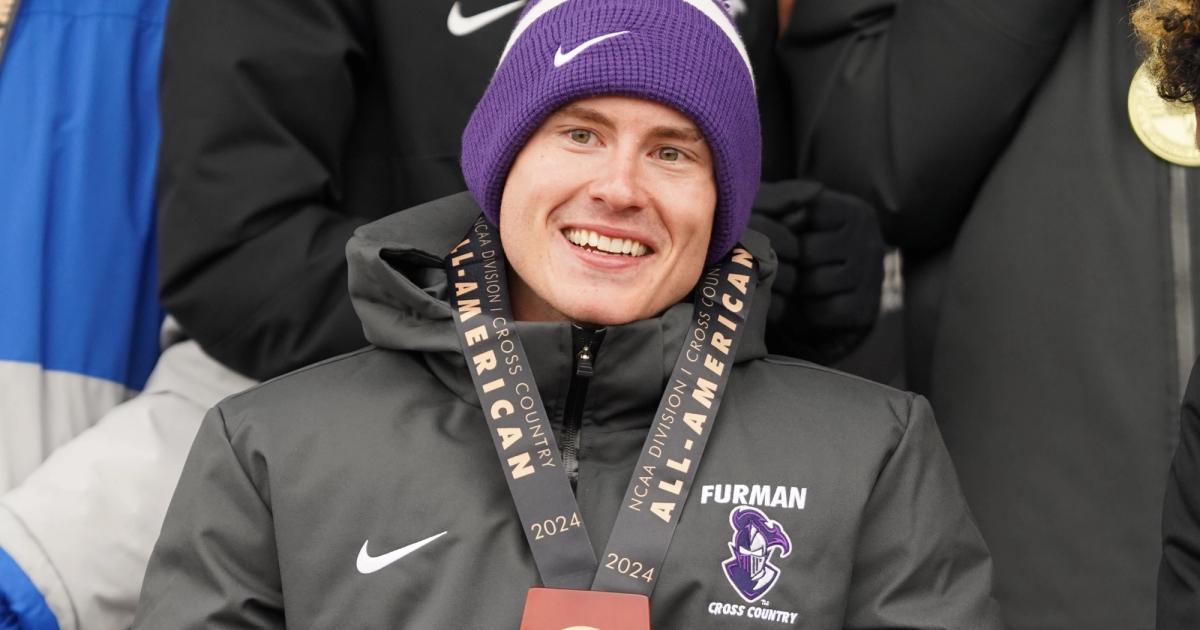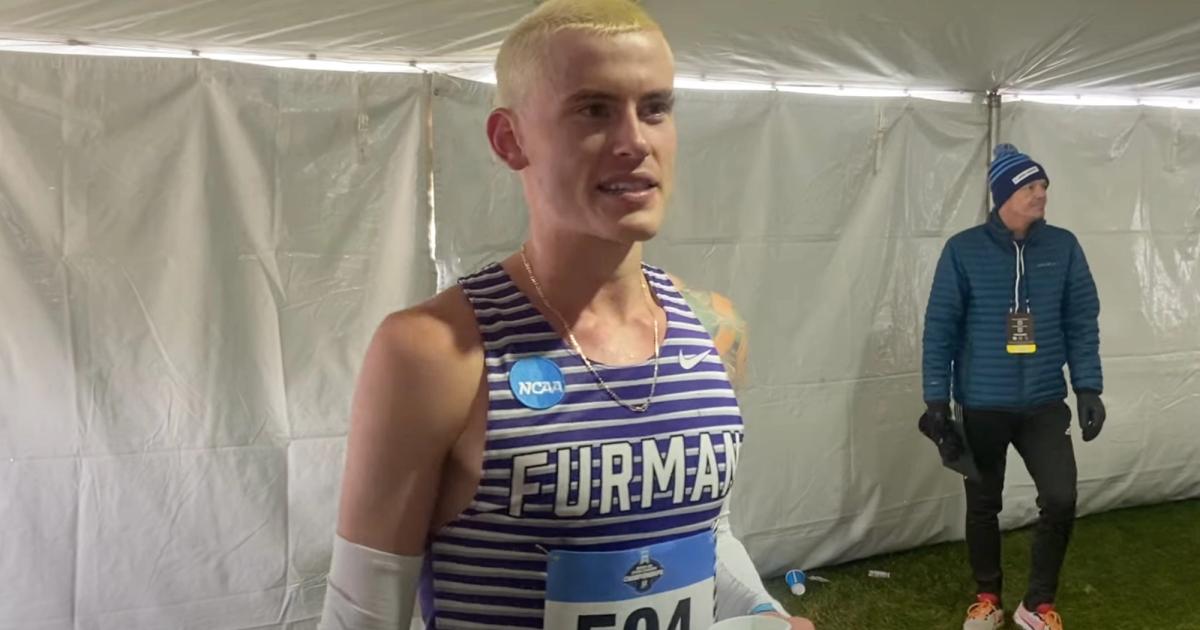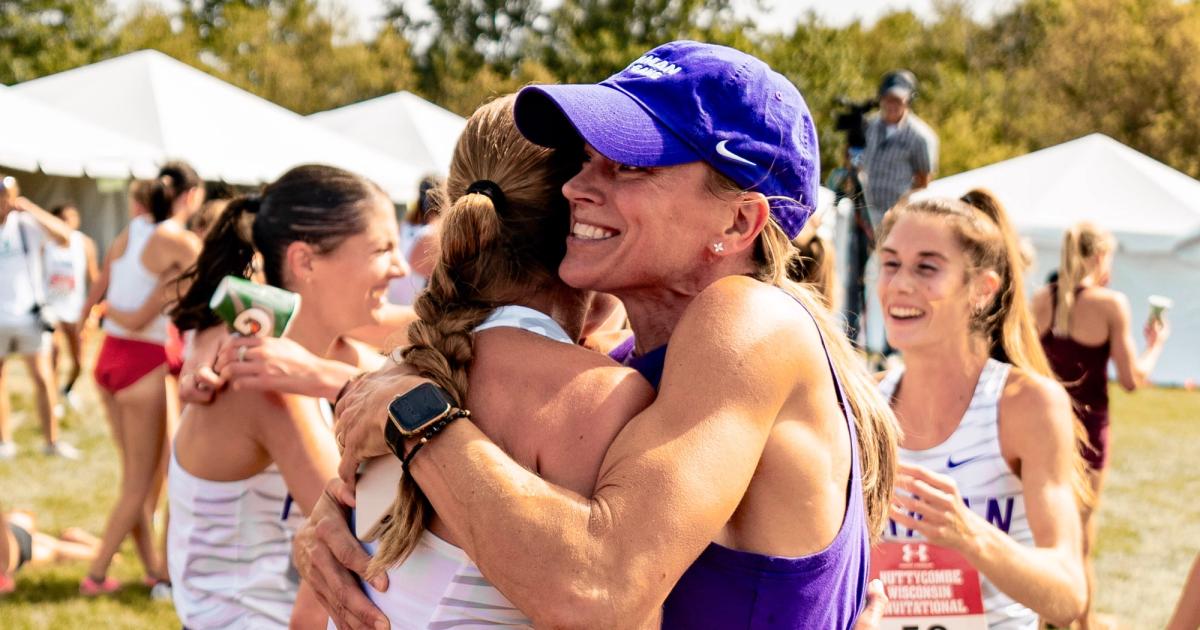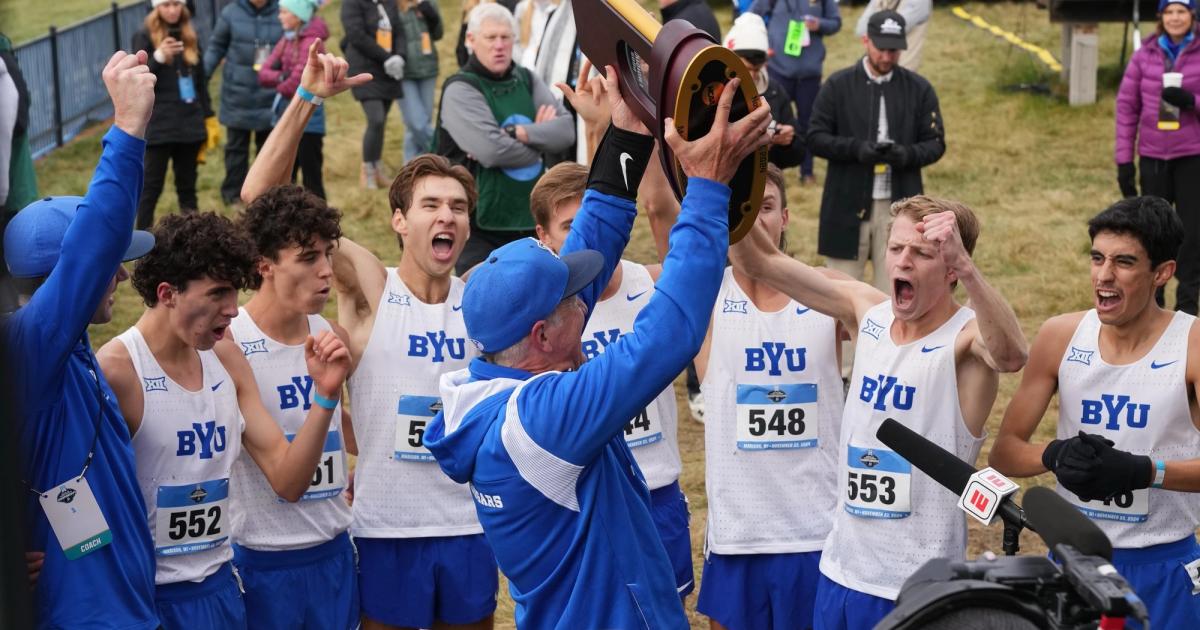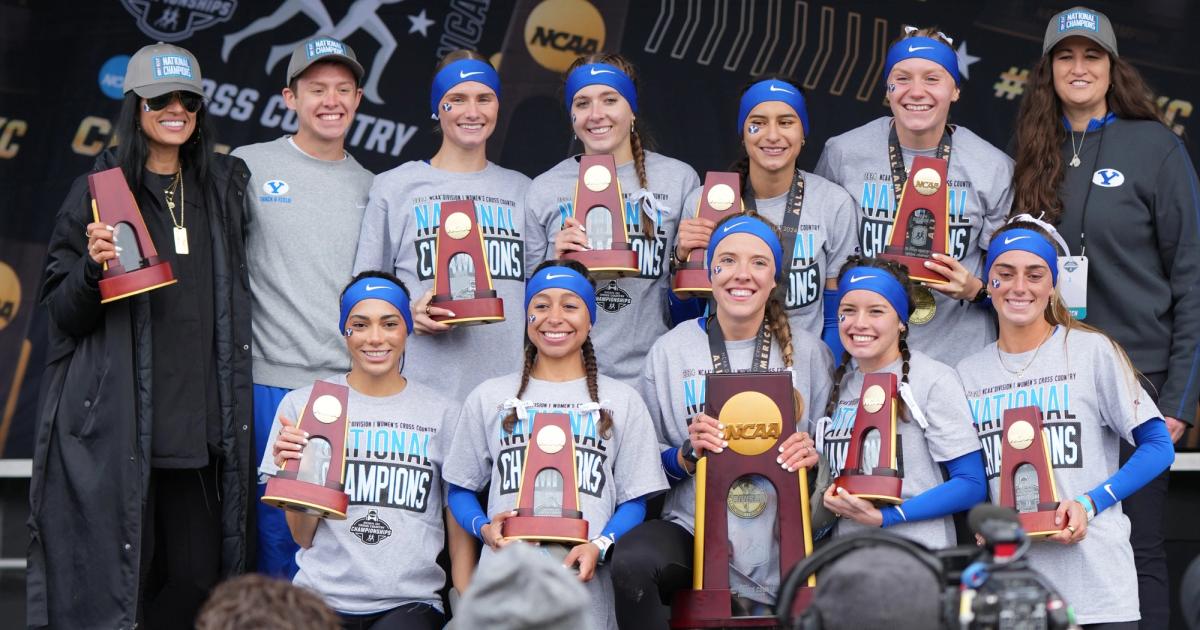By Jasmine Fehr
December 1, 2024
"My mindset is more just focusing on what I can do each day and not compare myself to others – just trying to be the best runner that I can be one one week at a time, one season at a time."
Furman senior Dylan Schubert has raced at a high level throughout his running career, but his third place finish at the 2024 NCAA Cross Country Championships marks his biggest breakthrough yet. Already a two-time cross country All-American with finishes of 11th in 2022 and 24th in 2023, Dylan was able to reach new heights this fall by finally securing a spot on the podium.
We had a chance to catch up with Dylan to reflect on his standout day in Madison. He opened up about his steady improvement throughout his career, his perseverance in bouncing back from two stress fractures this summer, and some of the key lessons he’s learned along the way. Dylan also shared about his mindset and what it means to train and compete with his team at Furman.
With a podium finish against the NCAA’s top distance runners, Dylan has solidified himself as one of the top stars to watch for in the sport.
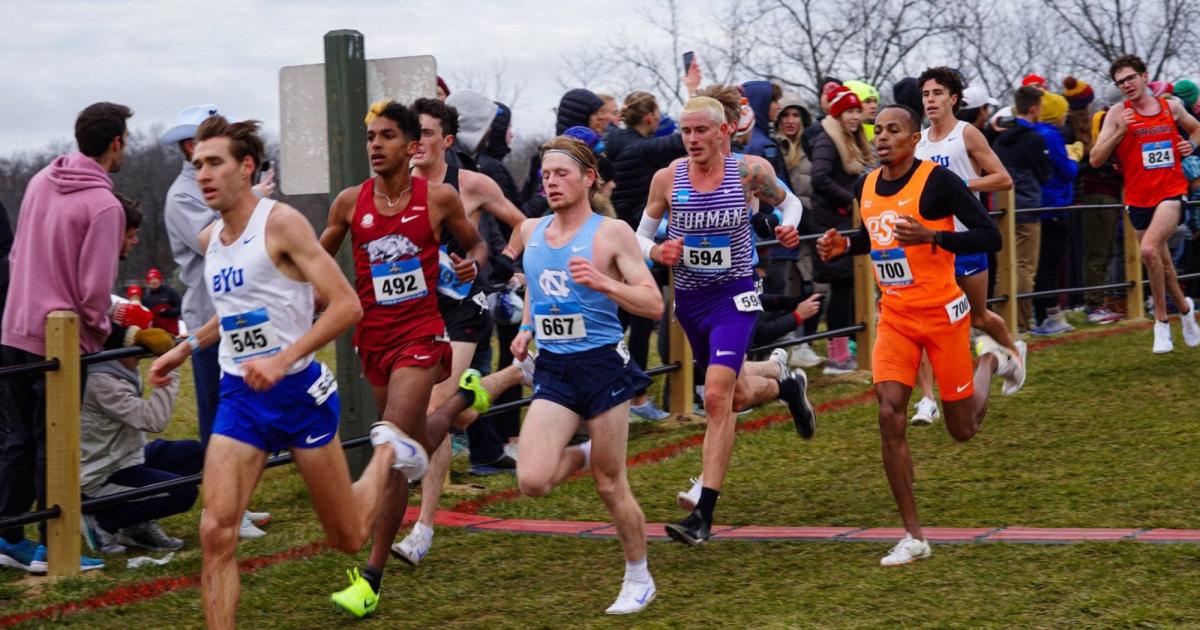
Courtesy Furman Athletics
This interview has been edited lightly for length and clarity:
Jasmine Fehr: You just placed third at NCAAs last weekend and led the team to a 17th place finish. How are you feeling?
Dylan Schubert: I was really happy with that performance. It was a pretty big breakthrough for me. I’ve had some solid performances in the past, but this one was where it all came together on the day. Also just being surrounded by my team this year was really special. The past two years that I've been to nationals, it was just me and Carson [Williams], who made it last year individually as well. But to have my team there really makes a special energy. It was super enjoyable and just celebrating with those guys afterwards was awesome.
The team wasn't ranked in the first couple weeks of the season and yet you guys finished 17th at NCAAs. Was there a point in the season where the team knew a finish like this was possible?
With me coming off injuries in the summer, and a couple other guys in similar positions early in the year, it was a slow start to things. We definitely needed to have one solid race and Pre-Nats was a solid race for us where we were able to get a few points, which ended up being really important based on our finish at regionals.
We had been saying all year that we would be a good team at the national meet – we just had to get there. We tend to race really well in those big invitationals, especially with our three-four-five guys running super even. It’s really easy for them to pack up and I think that bodes well in those bigger races. At [Southeast] Regionals, we just barely squeaked in [to qualify for NCAAs]. It was a big feeling of relief for us that we made it to nationals. We knew we could have a really solid day.
We executed a solid race. Everyone kind of says the same thing: you don't really have to run great at nationals. You just have to not run bad. I would say that's exactly how it went for us.
You mentioned regionals. Individually, you placed third. At nationals, you also placed third. Was this something you expected or was your national finish a bit of a surprise for you?
Based on experience from the past couple of years, my goal was to really pull in the reins. I really wanted to recover well from regionals. Honestly, half the battle is just how well you can recover off regionals. Two 10Ks in eight days is really hard to recover from, so this year I wanted to do a good job of coming off regionals well. I definitely was holding back a little bit there.
I had the best week of training between regionals and nationals that I’ve ever had in my time at Furman, so I think that was huge. Any year in the past, by that point I feel like I'm just holding on. But I was able to do a solid workout in between regionals and nationals feeling pretty fresh, so I think that was huge as well.
Last fall, you finished 24th at NCAAs and 11th the year before. Getting third place is a pretty big jump from 24th the year before. Was there a mental shift that needed to happen for you to go into this race, put yourself in it, and believe that you could be on the podium?
My progression is a little bit weird because last year I actually had mono. So earlier in the season, I had to take ten days completely off a few weeks before Nuttycombe. That year felt like cramming for a test the night before it was due. That’s just how the training was. I was just trying to whip myself into good shape.
The way that the race [2023 NCAA Cross Country Championships] played out with the start being so fast, I was nowhere near ready to handle that type of race. I came in doing pure strength work, just trying to get stronger and stronger. I had nowhere near enough legs to handle that sort of pace. Last year was just about trying to come off mono and do as well as I could. I was very happy with that finish. Taking ten days off in the middle of the season – especially with something like mono – it's not easy to race at the level you want to.
A couple of years ago when I was 11th, I was super fit. That was a great race for me. There's a lot of talent that has been added to the NCAA, but if you look at that year [2022] and the returners from that year to this year, I would probably be in the top five theoretically for returners. So I knew that if I had a good day, I could be up there near the front. I just told myself to try and expend as little energy as possible. I definitely ran smart and was happy with the way I ran. A lot of guys made moves that kind of cost them in the end. I was just letting the attrition occur around me. When I found myself getting deeper and deeper into the race, that was more and more motivation. That's kind of how it played out.
In your post-race interview, you mentioned that you've raced at five cross country championships and that you learn something new from each one. Now that you've had a chance to reflect on this year’s meet, what is the biggest thing you’ve learned?
I felt like I combined everything that I had learned from every previous year and created a near perfect race. No race is ever perfect, but as an underclassman, you kind of get thrown into it. It's really chaotic. Racing where there's so much density, like in the hundreds, it's almost a harder race because you have to create a race for yourself. You have to create a race around you and it's really hard to know where you're at. I think over the years, I've just learned more and more about what the start is like and what the moves are like in the front.
Last year was a key example of how hard it is if you're not well-established in the front and you're having to work your way up. Once you finally start to bridge the gap, the leaders have been resting and then they're ready to make another move. Then you get gapped again and feel like you're in this yo-yo. I made it a point this year to get out really strong and respond to every move and do whatever the pack in the front was doing. I think that really helped me. That was a huge takeaway.
You don't really get to do cross country at the post-collegiate level, but one thing I really took away was not being afraid to go out in front and run with big names, big competitors, and not shy away from that – even if on paper you might not be seen as a favorite or expected to be up there.
You also mentioned in your interview that you were injured during the summer. It can take a long time to come back from that and get up to full mileage again. What was that process like for you and how were you able to peak at the right time to be ready for nationals?
At the end of the outdoor season at nationals, I was running on two stress fractures: one in my foot and one in my shin, which was excruciatingly painful. I remember I couldn't even leave the hotel room. My coaches were bringing me Chipotle to eat in bed. The day before the race, I didn't even run. That was probably the hardest thing mentally I've ever done – try and toe the line with my foot hurting super bad.
So after that season, I needed a big break from running. I didn't do what I wanted to do at the end of the season and fell apart at the end. Whether you get sick or injured, you can't really use it as an excuse. You have to do it on the day. That's just how the sport is. So I just felt like I had messed up. Maybe there's a little bit of luck associated with it, but it was just unfortunate and mentally and physically I needed a big break from running.
I took four weeks of just doing nothing and then finally started to get into cross training. I picked up biking a lot this summer – I really like road biking. I did a lot of that back home and sort of eased my way back into running. The biking volume was always pretty high, even when I was building up my mileage. For example, if there was a week where I ran 40 miles, I would probably bike for eight to ten hours on top of that. So the volume was always relatively high.
I think it's okay to do that base work. I think cross training can substitute that decently. My tip to anyone who’s dealing with an injury is to just get strong using cross training and use it to your advantage. I don't think you have to hammer yourself when you're cross training. You can actually do more harm than good and risk burning out if you do that. I just did aerobic work and some threshold stuff on the bike.
Early in the season, at Pre-Nationals where I was 40th earlier in the year, I had a few solid weeks running and was still building my mileage. With all the biking, my legs were kind of heavy if that makes sense. As the mileage kept increasing and I biked less and less, I just started to get sharper throughout the rest of the year and came off every race stronger. It just really played out well by the end.
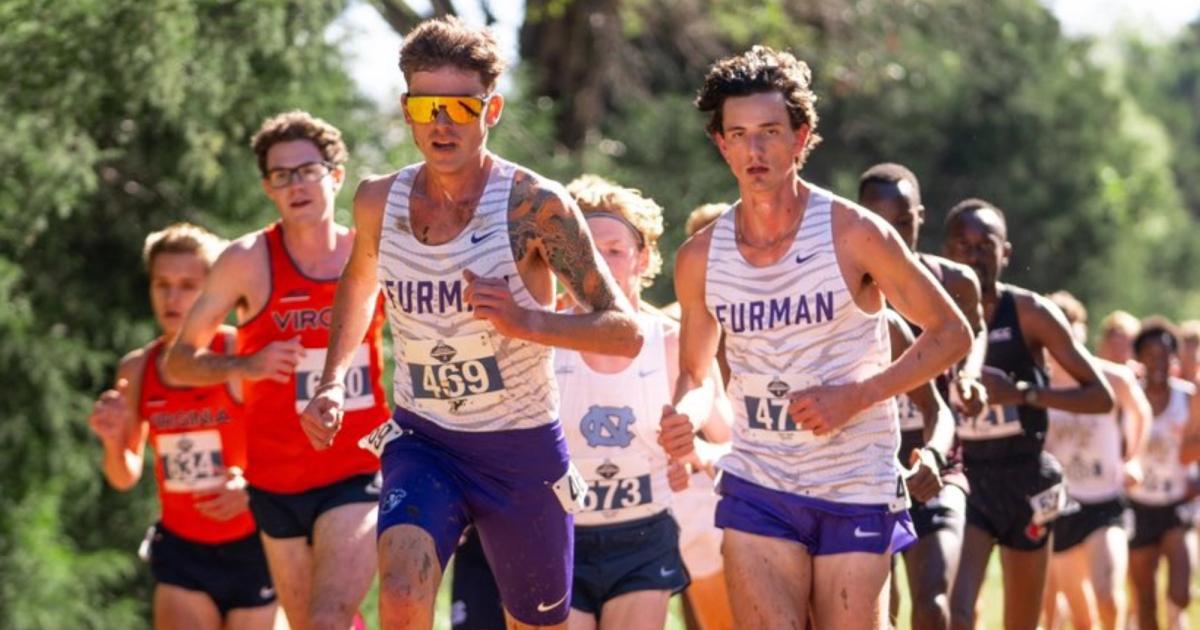
Courtesy Furman Athletics
Looking ahead to the spring, you’re going to face a lot of the same competitors again. What do you think it’ll take to land on top of the podium and win a national title during track season?
It’s taken a bit for me in college to start getting good on the track. I always had it in my head that I was more of a cross country guy and that [track] was one of my weaknesses. I made it a point to work on my track running, track speed, and closing speed. Last year I put together a decent campaign on the track and was able to run 3:58 – which by today's NCAA standards is not very fast for the mile, but for me it was huge knowing that I had the speed to run sub-four in the mile.
That’s something that me and Coach [Robert] Gary have been working on: making me faster and capable of running quick speeds on the track. In the outdoor season last year, I didn't really have a time trial race where it was super fast. It was more just tactical racing. I was pretty sharp at the end of the year. Aside from the injury, [East] Regionals went really well for me.
This year my goal is just to have a really consistent year health-wise. One thing that I've really been trying to do is underdo it by 5%. I think that’s better than overdoing it by 1 or 2%. That's something I've really been trying to be conscious of. I think I'm ready for solid performances in the track season on a national stage. I'm really looking forward to that.
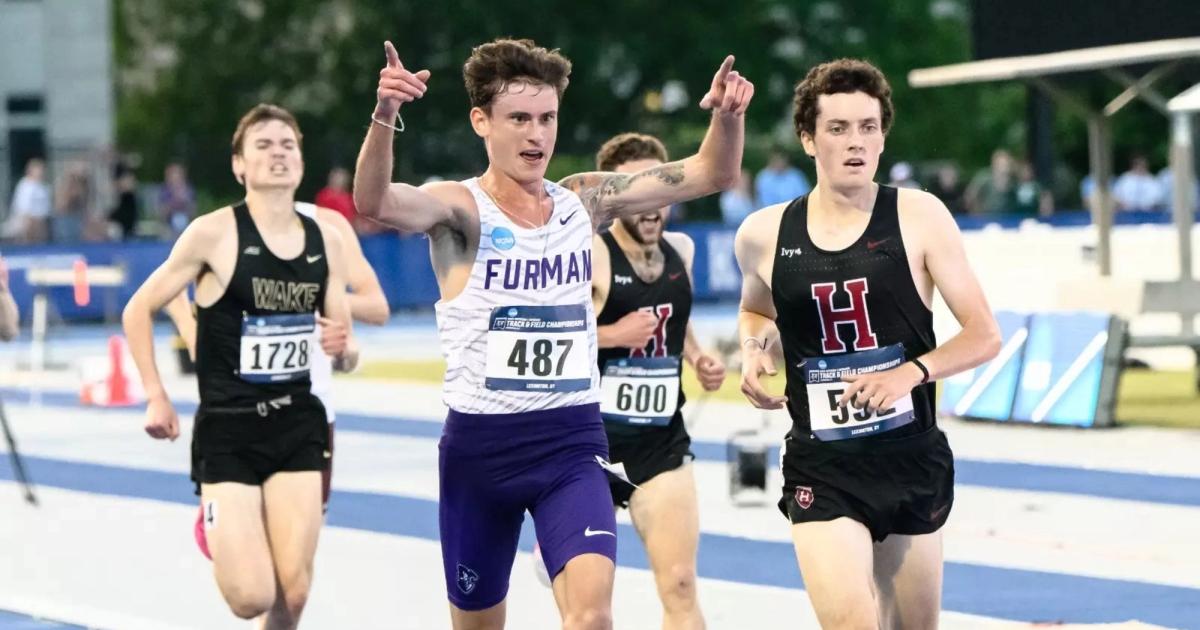
Courtesy Furman Athletics
What are your parting words of advice to our readers?
My biggest piece of advice, and something I've really learned over the years, is don't worry about what other people's trajectories look like. For me, coming into college and even in high school, I wasn't one of the top recruits or top prospects. I was 14th at NXN as a senior, but I wasn't running crazy fast times yet in high school. Then when I got to college, some of my peers were running really fast right out of the gate and getting all-American performances as freshmen. I was very far away from that. I think I was 127th at nationals my freshman year.
My mindset is more just focusing on what I can do each day and not compare myself to others – just trying to be the best runner that I can be one one week at a time, one season at a time. I think that's really helped me progress as a runner.
Being teammates with Carson Williams has helped as well. He was in a very similar position where out of high school, neither one of us were crazy superstars. The two of us have really fostered that mentality and have grown together here. That’s part of the Furman way: you start small and think big. If you look at a lot of the individuals that have come out of here, they have a very similar pattern. That was huge for me.
To add on to my advice, don’t be intimidated if it feels like there's an insurmountable amount of work ahead or if you feel like you're far away from running fast times. The same thing is going to happen to me if I decide to run post-collegiate: you're back at the bottom again and it's just a constant cycle. Try and find that joy in that process.
I love all of that. You have to trust your own timeline instead of comparing yourself to someone else’s trajectory.
Exactly!
Congrats again and good luck during indoor season!
___________________
Keep up with all things track and field by following us across Instagram, X, Bluesky, Threads, and YouTube. Catch the latest episodes of the CITIUS MAG Podcast on Spotify and Apple Podcasts. For more, subscribe to The Lap Count and CITIUS MAG Newsletter for the top running news delivered straight to your inbox.
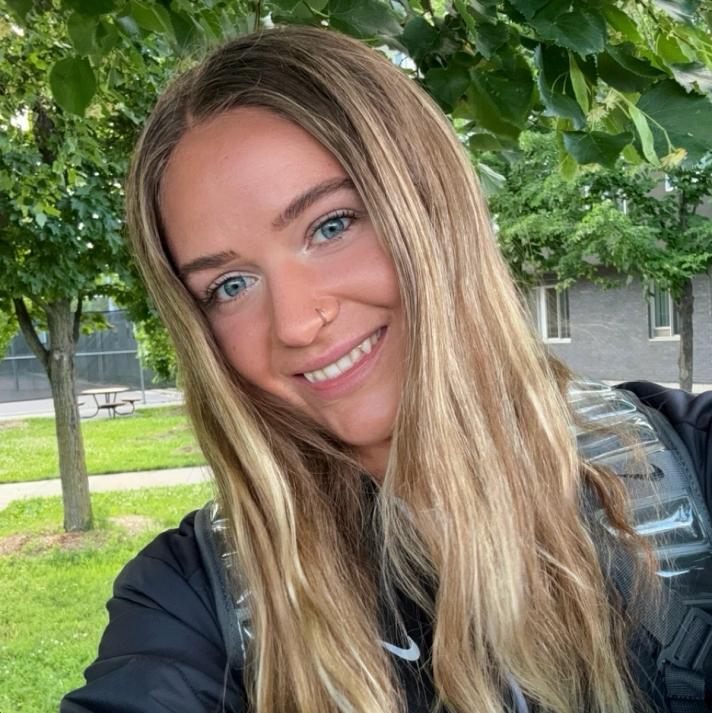
Jasmine Fehr
Jasmine Fehr produces the CITIUS MAG Podcast, manages our website, and shares content across our socials. She’s a marathon runner training in Flagstaff, Arizona. Her collegiate running career spanned the University of Portland and the University of Tennessee, where she earned a Bachelor’s degree in Psychology and Master’s degree in Communications.
